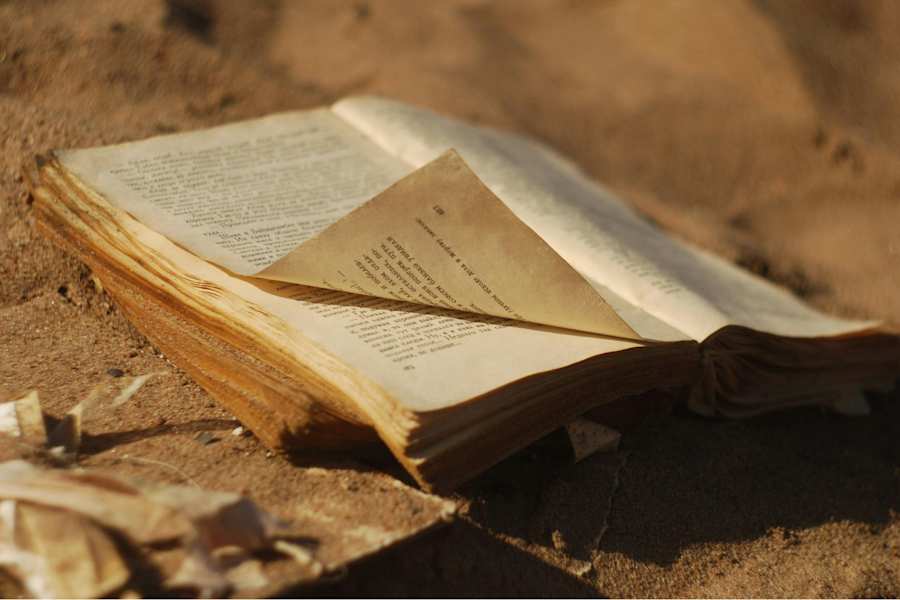
Take off your jacket: The erotics of books
Past the talking stage is the reading stage. Ed Luker looks between the lines to find out what makes sharing words with new and old lovers so titillating.
Scan to download

October 5th, 2023
The author of a new book on George Eliot talks about the questions, contracts, and considerations of marriage.
George Eliot—known in her early years as Marian Evans—is one of Britain’s most celebrated authors, most famous, of course, for Middlemarch, but also for several other significant works that take as their subject humanist struggles and triumphs. Eliot’s body of work extends far beyond her most renowned novel: her literary career began in essay writing and philosophical criticism before she started wrestling with fate and God in short fiction. Like many of us, she tried out poetry for a time, too, before turning back to fiction. At the heart of almost all of her works is a consideration of the couple—often not only married or approaching marriage, but yearning after marriage, regretting marriage, wondering if they might be better off marrying someone else.
Eliot was herself in a rather unconventional relationship for the Victorian era: a long-term relationship with a married man, George Lewes, whose wife had left him for his best friend. Together, Eliot and Lewes lived and wrote and loved for over two decades. Their bond flourished because of its contradictions: Eliot was subdued and thoughtful; Lewes was boisterous and funny. As her career took off, he took a step back from writing to manage their finances and household. They were entirely codependent—for better and worse. Clare Carlisle’s new book The Marriage Question combines biography and philosophy, and a thorough reading of Eliot’s letters and journals about her loving and surprisingly modern romance, to consider what it is about other people’s relationships that has enthralled us for so long. Carlisle teaches philosophy at King’s College London, and has long studied and written about Eliot—she even edited Eliot’s translation of Spinoza’s Ethics. Spinoza’s anti-individualistic beliefs, suggesting that coexistence is an essential part of life, heavily influenced both Carlisle’s and Eliot’s writing. Carlisle and I spoke over Zoom, from London and Brooklyn respectively, about how we present our romantic attachments to the outside world, which two characters in Middlemarch might represent Eliot and Lewes, and how marriage can transcend contractual obligation.
The Marriage Question blends philosophy, biography, and literary criticism. You bring in Plato’s “Allegory of the Cave,” and how in Eliot’s fiction, “with the help of an omniscient narrator, readers are simultaneously drawn inside a character’s consciousness and shown its limits, errors and delusion.” How did Eliot act as the narrator of her own relationship?
Eliot cultivated an idealized image of her marriage. As I worked on the book, I got a bit suspicious of that and realized that she had reasons to conceal the problems they had. That’s interesting, partly because it’s quite a general trope that we want to project a happy, successful image of our relationship to the world. Maybe we feel like it’s disloyal to our partner to talk about the difficulties in a relationship. I’m interested in marriage as a question that connects with one of the features of philosophy, which is to try to explore this distinction between appearance and reality. Plato talks about the fact that we’re like these prisoners looking at shadows on the wall. We take them to be real because we don’t have the ability to see what’s real and what’s a shadow. That maps onto the marriage question: that there’s a respectable, happy, and successful appearance of marriage, and then, behind closed doors, things can be very different. What Eliot’s fictions do is take us behind those closed doors and dramatize the inwardness of a marriage, something quite elusive and mysterious.
Was there a particular couple in Eliot’s fiction that fascinated you?
One of her earliest couples is in a story called “Janet’s Repentance.” in which Janet is married to a horrific husband. That story made me really realize how dark George Eliot was willing to go. It was surprisingly dark. Because Janet herself is a victim of domestic violence, but then she also becomes an alcoholic and is in disgrace. She isn’t a prim heroine. But then, also, I think my favorite George Eliot character is Gwendolen Harleth, the heroine of Daniel Deronda. She’s selfish and pretty foolish, but there’s something fascinating and compelling about her. She also probably has the worst husband in George Eliot’s fiction. Often it’s the darkest relationships that are the most interesting for me, partly because they’re not what you expect from a Victorian novel.
I love the chapter on Middlemarch, and your read on how its various marriage plots illustrate paths not taken. Saying yes to one thing is effectively saying no to something else. I was curious [about] what you saw as Eliot’s path not taken in her career and life.
The path not taken was the one that she was concretely envisioning for herself before she got together with Lewes. When they got together, she was already in her mid-30s. By Victorian standards, that was kind of old! She joked about the fact that she had given up on marriage. She was on track to write more conventional philosophical works, like she was planning a treatise of some kind, perhaps on the immortality of the soul. It would have been a life where she would have not made much money, not been famous.
In Middlemarch, the whole novel is crackling with that sense of possibility and what might have been and what might be, who you might be attracted to when you're already married to someone else. Whether that's the temptation of adultery, or whether it's the longing for something that isn't possible, Middlemarch is crowded with all these different possibilities.
As a reader, it’s easy to see a romantic relationship in a book like Middlemarch and map it back onto its author. But you write that perhaps the relationship between the Brooke sisters, Dorothea and Celia, might be more representative of Eliot and Lewes.
One of my favorite parts of the book, actually, is the relationship between Dorothea and Celia. Celia is just one of my favorite characters in Middlemarch. She's so funny, but she's also very, very lovable. The theme of that chapter of my book is philosophy, and [Middlemarch] is all about philosophy. I suggest, a little bit playfully, that Dorothea is this Platonic idealist who is always aspiring to wisdom or goodness. Celia is more like Aristotle: she's scientific, and she's making her observations. That mirrors the dynamic between Eliot and Lewes. Lewes was a scientist. He was very suspicious of metaphysics or any kind of speculation. Celia is this lovingly drawn character who has these echoes of Lewes's philosophical orientation, not necessarily his character, whereas Dorothea is someone who’s kind of foolish. I wonder if Eliot’s making fun of aspects of her younger self.
One of the big questions around marriage throughout Eliot's work is that of economic independence or empowerment. Eliot came into her relationship with control over her own money, but ceded that to Lewes. There's a preconception that independence equals empowerment, particularly in the context of feminism, this idea of the independent woman who doesn’t need a partner. And I don't really think that was true when they got together. How did the business side of their relationship empower her?
She became much more professionally successful than Lewes was, even though it was the opposite when they got together. Lewes was more involved in household management than a typical Victorian husband would have been. He acted as her secretary; he would open her mail for her.
I was really interested in exploring the dependence between them. They were intellectually collaborative. He was a writer too, and they were constantly reading each other’s work, talking about each other’s work. I was interested in exploring different kinds of empowerment that might come through interdependence.
There's that early note Lewes gives Eliot, that her pathos is better than her sense of fun. Do you think Eliot’s sense of fun was perhaps always there and not seen by Lewes? Or do you think it’s something that developed with their relationship?
She was very serious and melancholy. There's a passage close to the end of my book: one of the last scenes in their relationship is this autumn that they spend together before Lewes gets ill and dies. They're very conscious that their life together is drawing to a close. Lewes is writing a letter to somebody, and he says, “Oh, Eliot tells me to tell you that she’s very jolly.” And then he writes, “Jolly is not the word I would have used. I've seen her joyous and brilliant, but not jolly.”
Eliot was passionate. She was prone to depression, and she was a very serious thinker and introverted. Whereas Lewes was exuberant, extroverted, always told funny stories, maybe a more superficial character than she was. Her books can be really fun and funny. She does have a great sense of humor, but it's really tempered by that sensitivity and earnestness.
I’m curious if you feel like marriage is perhaps a more public thing now, compared to how it was back then or vice versa?
Part of the book is talking about how mysterious other people's marriages are to us. We're often intrigued by a couple and can't imagine what's going on there. One of the things that is so interesting in Eliot’s case is the way she calls their relationship a “marriage,” even though they’re not legally married. It’s an experience of marriage. That marriage isn’t necessarily defined by an official or legal status is a very modern idea. What matters most about the relationship is the experience of the couple, how they love each other.

Past the talking stage is the reading stage. Ed Luker looks between the lines to find out what makes sharing words with new and old lovers so titillating.

When your eyes get tired of reading through the literary canon, Luna Adler suggests turning to romantasy.

A brief history of the literary daddy and age-gap relationships.